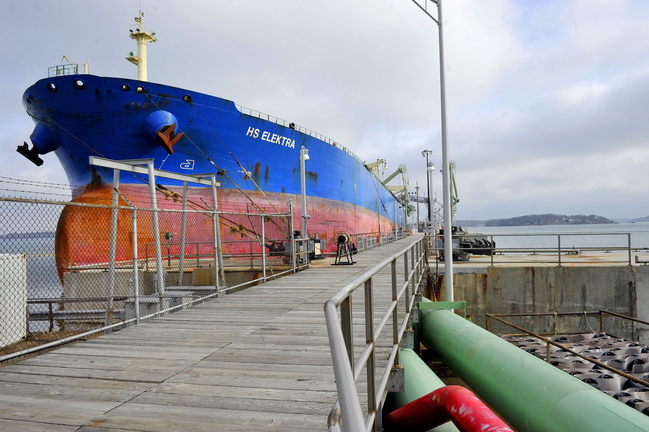SOUTH PORTLAND — Five city councilors announced Monday their opposition to the Waterfront Protection Ordinance, the controversial citizen initiative meant to ban the potential handling of so-called Canadian tar sands petroleum at oil terminals in South Portland.
The letter was signed by Alan Livingston, Michael Pock, Melissa Linscott, Linda Cohen and Gerard Jalbert.
“We believe that the proponents of the proposed Waterfront Protection Ordinance are well intentioned,” the councilors wrote. “Instead of banning a product, the proposed ordinance is a land use ordinance that can have a negative effect on our working waterfront and does not protect the blue-collar jobs of the working waterfront.”
Instead of calling a meeting of concerned residents, business owners and industry groups to discuss the issue from the outset, citizens brought the zoning change through an independent ballot initiative and constructed the proposal’s language without consultation from city leadership.
The two councilors who were not signatories are Patricia Smith and Mayor Tom Blake. Smith was the only councilor at an August meeting to vote to approve the zoning proposal outright without voters weighing in. Blake has been an outspoken proponent of the zoning measure, and speaks frequently on its behalf.
In a telephone interview, Jalbert questioned whether Blake would have attempted to derail talks about a council resolution of similar tone and content to the letter.
“We didn’t go through the City Council process of workshop because in my opinion Tom Blake lost perspective on the Waterfront Protection Ordinance,” Jalbert said. “Our belief is that he was going to block any attempt to put this on a workshop agenda as a resolve.”
Blake, reached by phone Monday evening, said he considers himself open to discussing any issue, and that any of the five who signed the letter could have asked to take the issue up this month. He said he is disappointed that so many councilors believe what he characterized as misleading information from oil-funding groups opposing the ballot question.
Jalbert said he attempted to contact Smith numerous times but was not successful; he said he did not attempt to reach Blake regarding the letter because of Blake’s clear stance in support of the ordinance.
Jalbert, cognizant of the open meetings law that prohibits councilors from interacting as a group without public notice, said he personally drafted the letter and one by one contacted the four other councilors via phone to get their support and tweak language. Jalbert created a personal email account to send the letter to the media Monday afternoon, he said.
Robert Sellin of Protect South Portland, the group that proposed the ballot initiative, said it was disingenuous of the councilors, led by Jalbert, to subvert the public process so deliberately.
“For him to navigate the letter of the law rather than the spirit, it’s just another insight into the fact that we can’t trust the process to protect the people from tar sands,” Sellin said. “That’s why we came up with this initiative, so the people could have a place at the table.”
The announcement illustrates the deep divisions in the community over the proposal, and the essential disagreement about what its language would do to the city’s multimillion-dollar oil terminals, which supply Maine and other states with gasoline, heating oil and other products.
Officially introduced in June, the Waterfront Protection Ordinance would amend the South Portland zoning ordinance to specify that permitted petroleum-related uses include the unloading of petroleum products from ships docking in South Portland. The amendment also would limit the enlargement or expansion of existing petroleum facilities.
Proponents of the ordinance proposal say it is narrowly tailored to block the handling of tar sands oil and would not affect the operation of existing businesses, including oil-handling operations at six terminals.
Opponents, in the form of the Working Waterfront Coalition, disagree, and say the ordinance amendment could spell the rapid demise of virtually all waterfront businesses that handle petroleum, in addition to some businesses that do not.
“We believe the correct way to address the concerns is to have all of the parties involved to meet and find a reasonable solution,” the five councilors wrote in their letter. “But that process was never offered by the handful of individuals who wrote the proposed ordinance without consulting with all of the leaders of the municipality of South Portland.”
The councilors’ position mirrors the position of the petroleum and waterfront business interests that have aligned to oppose the initiative. Their attorneys have said the ordinance proposal is overly broad, would hamstring businesses from adapting to market demands, and in the long run could shut down light-industrial waterfront operations.
Matt Byrne can be contacted at 791-6303 or at:mbyrne@pressherald.com
Copy the Story LinkSend questions/comments to the editors.




Success. Please wait for the page to reload. If the page does not reload within 5 seconds, please refresh the page.
Enter your email and password to access comments.
Hi, to comment on stories you must . This profile is in addition to your subscription and website login.
Already have a commenting profile? .
Invalid username/password.
Please check your email to confirm and complete your registration.
Only subscribers are eligible to post comments. Please subscribe or login first for digital access. Here’s why.
Use the form below to reset your password. When you've submitted your account email, we will send an email with a reset code.